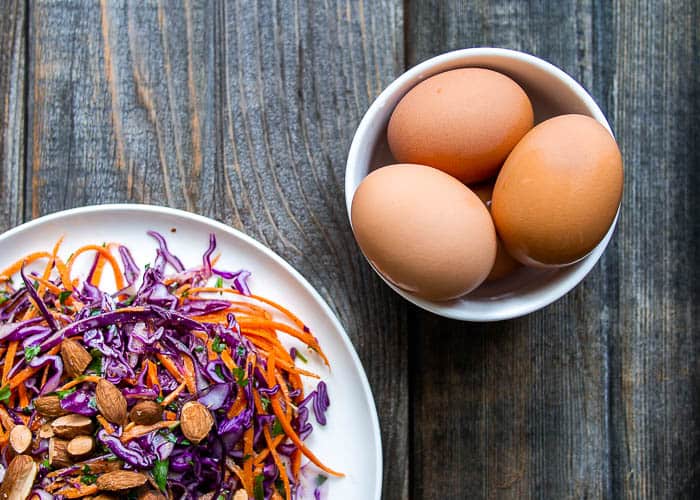Why do I eat eggs? After years of oppression, the health benefits of eggs are again being brought out on the table for discussion. Eggs offer a variety of nutrients that are harder to access in other foods. Here I will discuss the ethics of eating eggs, what type of eggs to choose, and the health benefits associated with eating eggs.
Over recent years eggs have gotten a bad rap. Unfortunately, when eggs at breakfast are replaced with overly processed breakfast cereals, our health suffers the consequences. Clarification on the effects of dietary cholesterol, the ethics of eating eggs, as well as the health benefits of eggs is necessary, and below I will shed some light on these topics.
Health Benefits Eggs
What Are The Nutrients Found in Eggs?
Eggs are rich in fat-soluble nutrients including vitamin A, vitamin D and the beta-carotene lutein. They are also one of the richest dietary sources of choline, contain folate, as well as trace minerals including iodine and selenium. Eggs are also an excellent source of protein (more on that below).
Plant-Based Diets and Vitamin B12
Plant-based diets are often limited in sources of vitamin B12. Vitamin B12 is only found in animal foods but is fortified into many vegan food products (milk alternatives, vegan meal alternatives, etc). Natural sources of vitamin B12 for vegetarians may include dairy products and eggs. One egg contains 0.6mcg of vitamin B12, and the Recommended Daily Allowance for most adults is 2.4mcg per day.
Health Benefits of Egg Yolk
Eggs Are High In Fat-Soluble Vitamins
Much of the health benefits of eggs are concentrated in the egg yolks. Egg yolks are a good source of vitamin A which is important for immune function and reproduction. Egg yolks are also rich in vitamin D, another fat-soluble vitamin that has a strong role in bone health (see my post Getting Enough Calcium For Bone Health On A Dairy-Free Diet for more on the role of vitamin D in bone health).
Eggs Are High In Lutein
Egg yolks contain lutein, a plant pigment in the same chemical family as beta-carotene which may protect against eye diseases. Dark leafy greens are also a great source of lutein but because lutein, like beta-carotene, is a fat-soluble nutrient, we require some added fat in order to absorb it (3). The lutein from eggs is naturally more accessible by the body due to the naturally occurring fat in egg yolks.
Note that adding a little olive oil to your spinach will offer 8,000 micrograms of lutein per ½ cup cooked compared to 200-345 micrograms in an egg (2).
Eggs and Omega-3 Fatty Acids
Eggs are also one of the few non-seafood sources of omega-3 fatty acids in the form of DHA. The DHA found in egg yolks, as well as fatty seafood, has been linked to numerous health benefits including a reduction in inflammation, blood clots, and blood pressure.
How Much Omega-3 Fatty Acid Do We Need
One egg contains as much as 40 milligrams of DHA (we require at least 650 milligrams per day of EPA and DHA combined), and omega-3 enriched eggs which come from hens being fed flaxseeds and/or processed fish meal can contain five to ten times this amount, but for a price.
Can We Get Omega-3 From Plants?
Vegetarian sources of omega-3 fatty acids, including flaxseeds, chia seeds, and hemp hearts, contain alpha-linolenic acid, which can convert to DHA and EPA but at very low amounts. It is also important to note that many factors can inhibit this conversion including excess omega-6 fatty acid, alcohol, and inadequate protein (see my post How To Get Enough Omega-3s for the Vegetarians and Vegans for more information).
Eggs Are High In Choline
Choline is a B-like vitamin, and the reason you probably haven’t heard too much about it is that the first recommended intakes for choline were only issued in 1998. One of the most important functions of choline is that it works much the same way as folate, and is important for the developing brain. It is also needed to produce acetylcholine, an important neurotransmitter for memory, mood, muscle control, and other brain and nervous system functions (1).
How Much Choline Do We Need?
Recommended intakes for choline are 425 or 550 milligrams per day for adult females and males respectively – just two large eggs with the yolk contains 294 milligrams. The only other food that is richer in choline than eggs is liver.
Can We Get Enough Choline Without Eggs?
For vegetarians, ½ cup roasted soybeans contain 110 milligrams of choline, while ½ cup cooked kidney beans, ½ cup quinoa, ½ cup Brussel sprouts, collard greens, broccoli, cauliflower or peas all contain between 25 to 45 milligrams of choline (1). It is possible to get enough choline without eggs, but a lot more planning is necessary.
Health Benefits of Egg Whites
Eggs Are High In Protein
Eggs are an excellent source of protein, most of which is concentrated in the egg white. The type of protein in eggs is of high biological value and offers us all the essential amino acids needed for normal growth and repair (think tissues, muscles, cells, hormones, enzymes, skin, etc).
Protein At Breakfast
I’ve written about the importance of adequate protein, especially at breakfast, in previous posts (see Cottage Cheese Omelette with Kale and Mushrooms, Banana-Free Cauliflower and Greens Smoothie Bowl, Steel Cut Oats with Peanut Butter for more high protein breakfast ideas). I cannot stress the importance of achieving balance at breakfast by being conscious of carbohydrate load and aiming for at least 15-20g of protein.
Replacing Carbs with Eggs
Replacing refined carbohydrates with eggs has been shown to result in fewer cravings throughout the day, and fewer spikes in blood sugar and insulin (5). Eggs are a great source of protein with 6 grams per egg; serve your eggs with a low glycemic-index sweet potato hash, or sautéed with some vegetables for a nutrient-packed scramble.
The Ethics of Eating Eggs
What’s Wrong With Conventional Eggs
For many years I strayed from eggs. The images of overcrowded and filthy cages filled with thousands of chickens in cages piled one on top of another in batteries infamous for accumulated feces, feathers and feces haunted me. Caged eggs come from hens that often never see daylight, and are routinely fed low-levels of antibiotics.
Happy Hens Make Healthy Eggs
When it comes to the health benefits of eggs, just as with other animal food products, the health and wellbeing of the hens will be mirrored in their eggs (see my post For The Flexitarian – Sustainable and Healthier Meat Choices). Hens that are raised on the pasture and have access to sunlight (vitamin D), natural food including insects (vitamin A), and are surrounded by natural elements will produce healthier eggs.
Organic Eggs vs Conventional Eggs
If you do not have access to farm eggs, Certified Organic guarantees that the eggs come from hens that eat organic feed and are allowed to access the outdoors and sunlight. They are regularly inspected to make sure the rules are followed.
Health Benefits of Eggs – Free-Range Eggs vs Caged Eggs
Health Benefits of Pasture-Raised Eggs
Lily Nichols, a Registered Dietitian, and Author introduced me to this study comparing the nutrient density of eggs from pasture-raised chickens compared to commercially-raised hens (3,4). Eggs from pasture-raised chickens had:
- A 30% higher Vitamin A content which is attributed to the fresh greens, grasses, and bugs a chicken eats. Vitamin A contributes to the rich orange colour of the yolks,
- Twice as much Vitamin E,
- More than double the content of Omega-3 fatty acids, and lesser amounts of omega-6 fatty acids leading to a more preferable ratio of omega-6 to omega-3,
- A 3-6x higher content of Vitamin D, due to regular sun exposure.
Health Concerns with Caged Raised Eggs
As if being lower in vitamin D, vitamin E, vitamin D and omega-3 fatty acids are not enough, caged hens also often suffer from serious health conditions caused by their crowded living conditions. This can include osteoporosis, bone fractures, and prolapsed uteruses from being bred to lay eggs at an unnaturally high rate.
Health Benefits of Eggs – Eggs and Cholesterol
Cholesterol and Heart Disease
There is no argument about whether dietary cholesterol raises blood cholesterol; it does. There is also no argument about whether a high level of cholesterol in the blood raises the risk for heart disease; it does.
But there is still some uncertainty about how dangerous the effects of high blood cholesterol might be, and about whether having high blood cholesterol is bad for everyone, or only for those individuals who are especially sensitive to its effects for reasons of family history.
Do Eggs Raise Cholesterol Levels?
One egg contains 300 milligrams of dietary cholesterol, and 300 milligrams is the general daily recommendation for cholesterol intake. Some people are what we call ‘hyper-responders’ and can be more sensitive to dietary cholesterol than others. This is often hereditary, and despite a healthy, balanced diet some people will have higher cholesterol levels than others.
What Other Dietary Factors Raise Cholesterol Levels?
It is also important to consider that blood cholesterol is also affected by many other factors. Saturated and trans fats in food raise ‘bad’ or LDL blood cholesterol levels and do so more effectively than the cholesterol in eggs. Unsaturated oils, fruits, vegetables, whole grains, especially those high in soluble fibre, can help to reduce LDL blood cholesterol.
What Lifestyle Factors Raise Cholesterol Levels?
It is not just diet and genetics that can contribute to high blood cholesterol, smoking, inactivity, diabetes, obesity, and age also play a part.
How Many Eggs Per Day?
Take note that many studies attempting to prove that dietary cholesterol has no effect on heart disease risk are sponsored by industry. For now, we can all agree that 300 milligrams of dietary cholesterol per day, which equates to about one large egg per day, is acceptable for most people.
What Can We Do About High Cholesterol Levels?
Many people can tolerate dietary cholesterol without significant effects on their blood cholesterol levels. If someone has high cholesterol, and diet is a suspected culprit, I would suggest taking out foods containing trans fats, foods high in saturated fat (especially from meat) and refined carbohydrates, and look at increasing fibre and healthy fats including olive oil, nuts and avocado.
Those with diabetes or a history of heart disease should speak to their health professional about appropriate recommendations for them.
The Health Benefits of Eggs – Should You Eat Eggs?
Eggs are a nutrition powerhouse and are packed full of so many essential nutrients that can be harder to access in other foods. If you eat eggs, choosing free-range organic helps ensure that the welfare of the chicken has been considered and offers a food superior in nutrition.
References for The Health Benefits of Eggs
1. Choline: Fact Sheet For Health Professionals. National Institute of Health
2. What To Eat (2006). Marion Nestle
3. Real Food for Pregnancy (2018). Lily Nichols
5. Egg Breakfast Enhances Weight Loss (2008). International Journal of Obesity






Love this post!!! So many good things about the good old egg I am going to make your Japanese salad bowl tomorrow! ❤️
Yayyy!! Yes I love them on our quinoa glory bowl too. I hope you love the Japanese Salad bowl – that miso tahini dressing is one of my favs. We had it tonight!